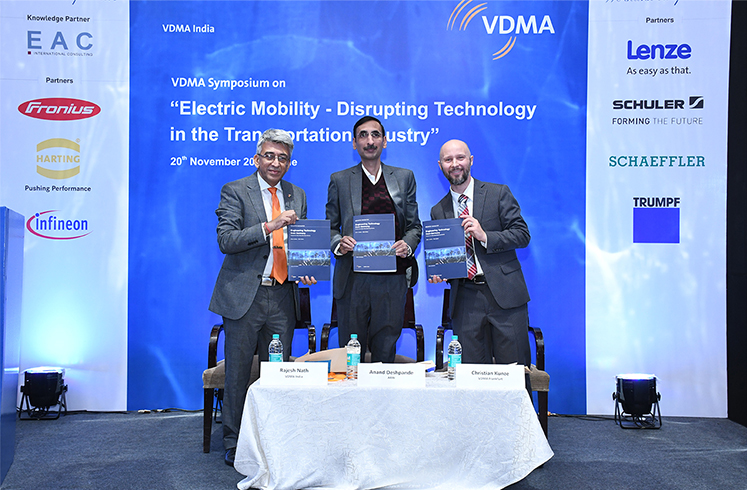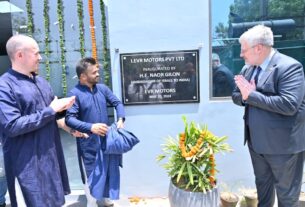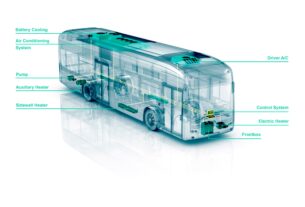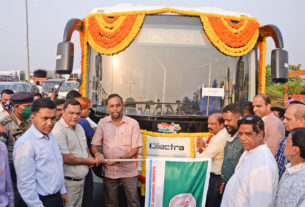There are almost 1 billion motor vehicles worldwide, 700 million of them are cars and this number is expected to more than double, no later than 2030. The Indian Government’s policies and initiatives have been to advance electric mobility and support the increasing use of electric vehicles. In the light of this burgeoning potential, VDMA India along with the VDMA E-Mobility Forum Frankfurt, organized two symposiums on “Electric Mobility – Disrupting Technology in the Transportation Sector” in Pune on 20th Nov 2019 at The Hotel Hyatt Regency and on 21st Nov 2019 in Bangalore at The ITC Windsor. These two Symposiums were aimed at creating a common platform for working towards the process of putting up a clean and sustainable mobility for India by the year 2030.The event focussed on technological advancements and innovations by German Organizations to bring in alternate solutions for a greener environment in future.

The Symposium at Pune and Bangalore commenced with the welcome address by Mr. Rajesh Nath, Managing Director, VDMA India, who mentioned that there will be 30 percent Electric Vehicles in India by 2030 in comparison to the current, less than 1 percent of electric vehicles. This followed by the traditional lightning of the lamp by the VIP Guests and speakers at both the cities. After lightning of the lamp, VDMA Annual Publication, Industry Navigator, was released by the VIP Guests at both the cities of Pune and Bangalore. After the publication release, the participants in Pune were addressed by the Chief Guest, Mr. Anand Deshpande, Senior Deputy Director & Head Automotive Electronics Department, Automotive Research Association of India (ARAI) who highlighted the government policies for accelerating the adoption of Electric Vehicles. Also, the regulations and standards for the Electric Vehicles and the charging environment.
In Bangalore, the Chief Guest was Mr. Shivayogi Kalasad, Managing Director, Karnataka State Road Transport Corporation (KSRTC). He said that, Karnataka is one of the ten states to have taken a lead with a separate EV policy in 2017. He also mentioned that KSRTC is now in the process of adopting 400 electric buses, both for within Bangalore and inter-city mobility. He added that the bane of Indian society is the pride in owning a car and it is seen as a status symbol. The Guest of Honour for the day was, Mr. Peter Schmid, Head of Administration, Consulate General of Germany, Bengaluru, who said that Germany and India will work towards low carbon mobility. He mentioned that Norway aims to go totally electric by 2025, Denmark by 2030 and Sweden is on the fast track to installing charging points.
The inaugural session at Pune and Bangalore was concluded with the presentation by Mr. Christian Kunze, Deputy Managing Director, E-Mobility Forum, VDMA Frankfurt on “FVA from Gear Research to Holistic Drivetrain Technology- Precompetitive Research for Electro mobility”. Mr. Kunze, who is travelling from Frankfurt, Germany for this Symposium, informed the participants that innovation has decreased in the small and medium companies and mostly, the innovators are the big players. He also emphasized the need to think exponentially and not linearly. He said that battery manufacturing is going to be the big business in the future and the need to bring down the cost of lithium-ion batteries is paramount to lower the cost of electric vehicle.
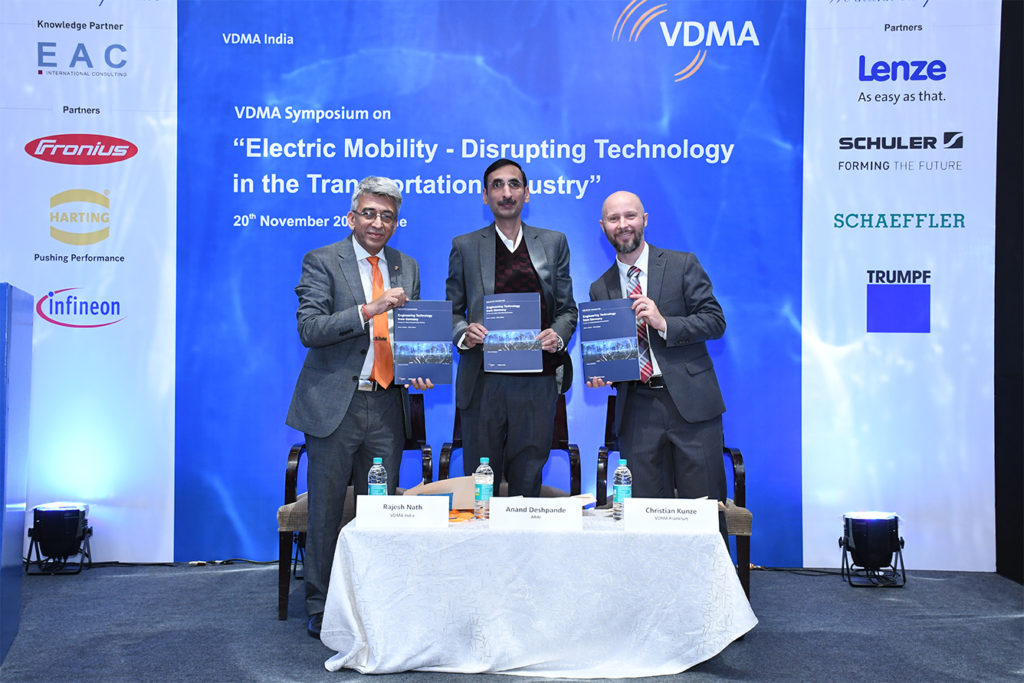
There were a total of eight speakers under technical sessions – I & II in Pune and seven speakers in Bangalore. Many companies were present at both the cities of Pune and Bangalore like Schaeffler India Ltd, Schuler Pressen GmbH, Harting India Pvt Ltd, Trumpf India Pvt Limited, Infineon Technologies India and EAC Consulting. The additional speakers at Pune were from Fronius India and Lenze India and at Bangalore it was Altair India. The speakers at both these cities focussed on the entire value chain of the Electric Mobility ecosystem, from the Powertrains, power electronics to the charging infrastructure.
The knowledge partner at Pune and Bangalore was EAC International Consulting. Mr. Vineet Martin, Managing Consultant, EAC India gave his presentation on “Impending E-Mobility Penetration in India”. He said that India currently has just around 250 public charging stations. The Indian government is helping in securing lithium from Bolivia, whose government claims to have 70 per cent of the world’s reserves. The government is also working on a recycling policy for lithium ion batteries. He also said that the plan of one charging station in a 3 Km range in cities and 25 Km on highways is being worked by the Government.
Schaeffler India Ltd., was represented by Mr. Anirban Mukherji, Head- Automotive at Pune and Mr. Harsh Desai, R&D and Project Management-E-Mobility at Bangalore. Their presentations were on “Innovative Solutions meeting stringent Co2 regulation accelerating the market”. They highlighted the effect of Co2 emissions on the environment, including the CAFÉ norms and the Powertrain and Motor technology suitable to the Indian market.
Infineon India was represented by Mr. Vinay Shenoy, Managing Director, in Bangalore, who spoke on “Building Strong Local Value Chain for EV”. He said that the battery pack is 43 per cent of the total cost of the car and we should find ways of bringing this cost down. He also said that the E-rickshaws have gained ground in various cities, but not by the bigger players. The imported kits are assembled by small metal fabricators. It makes sense, if such kits are made available locally in India to build a local ecosystem. In Pune, Mr. Girish Kamala, Director, Infineon Technologies India made an insightful presentation on “EV Trends and Semiconductor Applications”. He emphasized the importance of Power Electronics in Electric Vehicles, which is gradually making the EV’s more software driven, which would lead to autonomous more.
Mr. Markus Roever, E-Mobility Global Sales Head, Schuler Pressen GmbH, made a presentation on “The Future of Prismatic Battery Case Production”. He informed the participants on the entire technological process involved in Prismatic battery case production, which is the need of the hour in battery production in India.
Harting India Pvt Ltd. was represented by Mr. Arvind Tekur, Director Marketing & Product Management, who spoke on Electric Mobility Solutions. He talked about the entire charging infrastructure solution from the Harting stable and the customized solutions based on need of the system.
Trumpf India Pvt Ltd., was represented by Mr. Sachin Gambhire, Associate Director, Business Development & Marketing, who presented on “Laser Applications in e – Mobility”. In his inimitable style, he explained the benefits of Laser applications in machining Electric Vehicle components, especially the machining of the motors using lasers that considerably improves quality and at low cost.
The speaker Mr. Debasis Nandi, President – South & South East Asia, Lenze gave his presentation on “Innovation for E – Bus”. He spoke about the Mobile Modular System with AC/DC and DC/DC convertors wide applications with several impressive case studies, especially applicable to the Bus or LCV/HCV sectors.
Fronius India Private Limited was represented by Mr. Prasad Patil, Automotive & Robotics Division, who gave the presentation, on “Joining solutions for EV vehicles” at Pune only. He gave an excellent demonstration of High Welding Productivity, especially welding of lightweight materials like aluminium, to reduce weight of EV, the need of the hour.
The speaker Mr. Sushil Mane, Director, Altair India Pvt Limited presented on the topic of “System-Driven Simulation for e-Mobility”. He gave an impeccable analytical data on the Computer Aided Engineering (CAE) simulation models based on Physical Engineering and Data driven models. The applications of these tools in the designing of the entire range of components in Electric Vehicles, which would accelerate the speed to market and reduce product cycle times.
The Electric Mobility Symposium at both the cities had table spaces for the partners and they had displayed their products and services along with brochures. The Symposium in Bangalore had a B2B partner, FrankfurtRheinMain GmbH, represented by Mr. Jay Bedarkar, India Manager. His task was to promote FrankfurtRheinMain as a business location and support companies, who want to start a business or expand their company in Europe or in Germany specifically.
The Symposiums at Pune and Bangalore was moderated by Mr. S. Manohar including both the technical sessions and each session was followed by Q&A.


